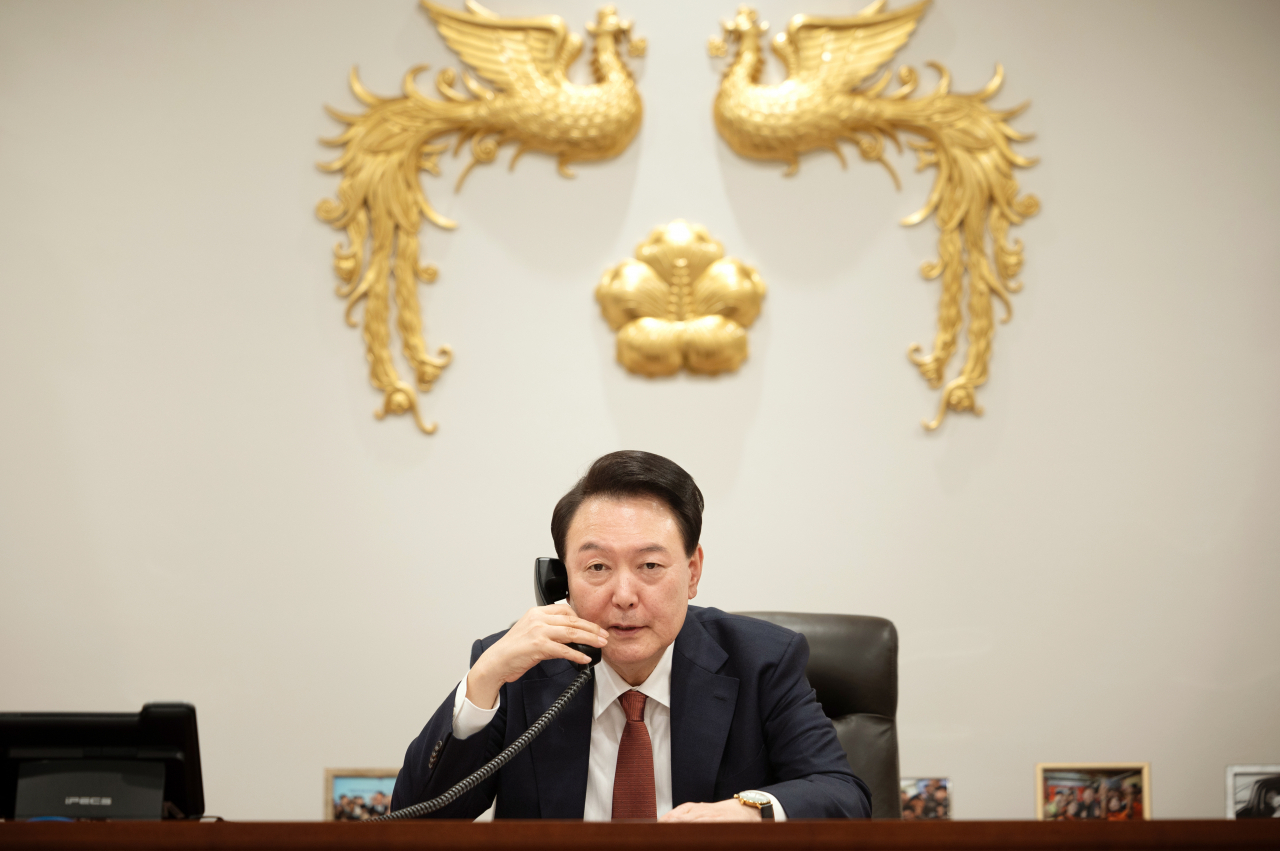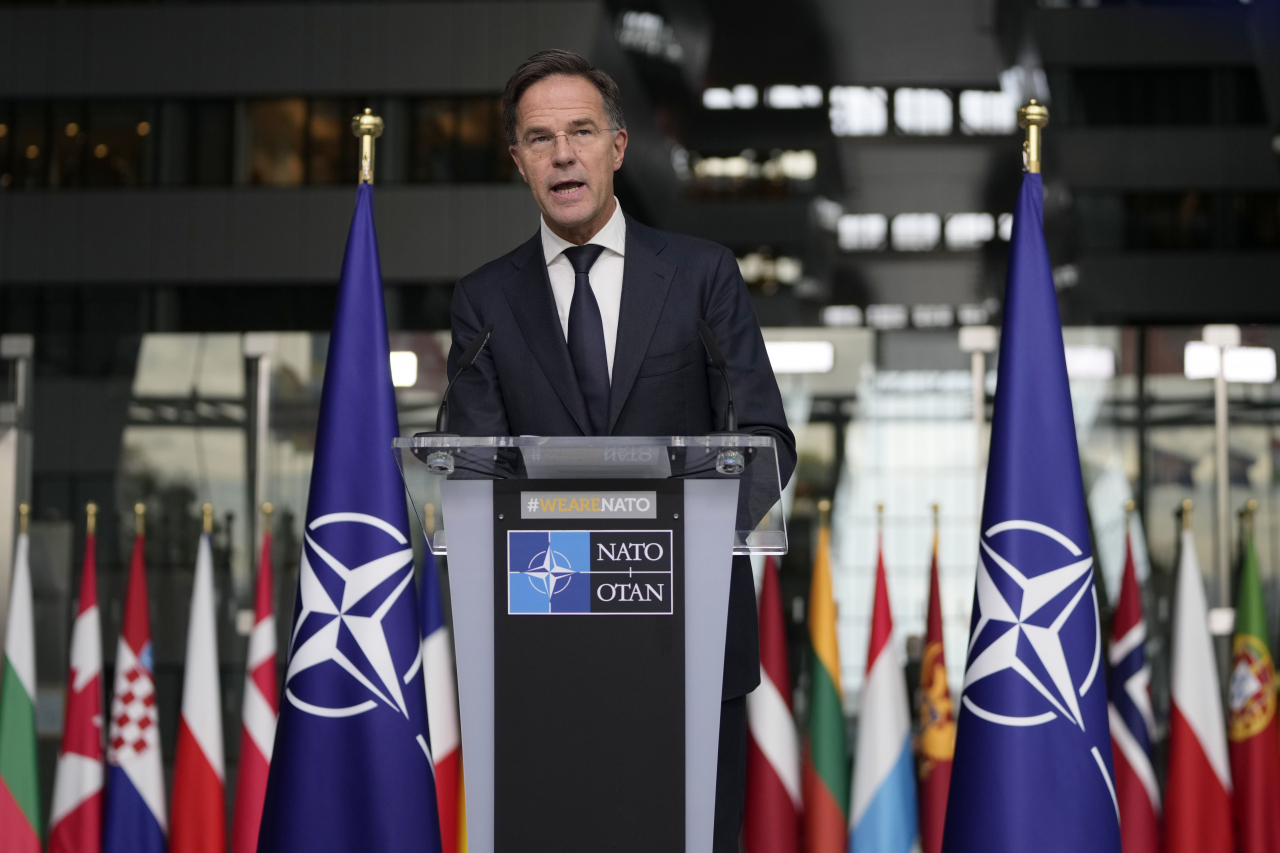 |
President Yoon Suk Yeol speaks during his phone call with European Commission President Ursula von der Leyen at the presidential office in Seoul on Monday, in this photo provided by his office. (Yonhap) |
South Korean President Yoon Suk Yeol warned Monday that North Korean troops could be deployed by Russia to the front lines against Ukraine "sooner than expected," according to the presidential office.
Yoon shared intelligence on North Korea's troop deployments to Russia and discussed potential response measures during a phone call with European Commission President Ursula von der Leyen, held at her request, the presidential office said in a statement.
"The (South Korean) president explained that North Korean forces could actually be deployed to the front lines against Ukraine sooner than expected, which is a grave situation," the statement read, without further details.
South Korea's National Intelligence Service initially assessed that around 12,000 North Korean soldiers would be sent to Russia by December, with approximately 3,000 having arrived on Russian soil as of Oct. 23.
During the phone call, Yoon also stated that the South Korean government would "actively implement phased measures depending on the progress of military cooperation between Russia and North Korea, while urging the immediate withdrawal of North Korean forces and the cessation of Russia-North Korea military cooperation."
In response, von der Leyen stated that the EU would remain vigilant, collaborating with member states to formulate proactive measures addressing military cooperation between Russia and North Korea. She also pledged to work closely with South Korea throughout this process, according to Yoon's office.
Yoon also shared "the latest intelligence on North Korea's troop deployments to Russia and their involvement in the Ukraine war, discussing potential response measures" during a phone call with NATO Secretary-General Mark Rutte on Monday, according to Yoon's office.
The phone call -- which followed a previous one on Oct. 21 -- occurred shortly after a high-level South Korean government delegation, led by Hong Jang-won, first deputy director of the National Intelligence Service, briefed NATO's North Atlantic Council on North Korean troop deployments to Russia.
The session, held at NATO headquarters in Brussels, was attended by ambassadors from NATO’s 32 member countries and its four Indo-Pacific partners: Australia, Japan, New Zealand and South Korea.
Yoon also explained that the high-level South Korean government delegation would hold a separate briefing on North Korean troop deployments to Russia at the EU’s Political and Security Committee on Tuesday.
During the phone call, Yoon further outlined plans for the government delegation to visit Ukraine afterward to share information on the current war situation with intelligence and defense officials and to discuss future cooperation measures with Ukrainian authorities.
 |
NATO Secretary-General Mark Rutte delivers a statement after a meeting with a high level South Korean delegation including top intelligence and military officials as well as senior Korean and NATO diplomats at NATO headquarters in Brussels on Monday. (AP) |
Meanwhile, following the South Korean government’s debriefing at NATO, Rutte publicly confirmed the deployment of North Korean troops to Russia’s southwestern Kursk region, where Ukrainian forces have maintained a foothold since August.
"Today, I can confirm that North Korean troops have been sent to Russia and that North Korean military units have been deployed to the Kursk region" Rutte said Monday during a press briefing following the briefing.
"The deployment of North Korean troops represents, one, a significant escalation in the DPRK's ongoing involvement in Russia's illegal war; two, yet another breach of UN Security Council resolutions; and three, a dangerous expansion of Russia's war."
The DPRK stands for North Korea's official name, the Democratic People’s Republic of Korea.
The NATO chief condemned the deepening military cooperation between Russia and North Korea as a "threat to both Indo-Pacific and Euro-Atlantic security," calling for the two countries to immediately halt all military cooperation, including North Korea's troop deployments.
Rutte further emphasized, "But the deployment of North Korean troops to Kursk is also a sign of Putin's growing desperation."
The NATO chief explained that over 600,000 Russian soldiers have been killed or wounded in Russian President Vladimir Putin's war and "he is unable to sustain his assault on Ukraine without foreign support."
"NATO allies will continue to support a free and democratic Ukraine, because Ukraine's security is our security. Today, we discussed the need to further strengthen military support to Ukraine," Rutte told reporters.
"We are actively consulting within the alliance, with Ukraine, and with our Indo-Pacific partners on these developments, and we continue to monitor the situation closely."






![[Herald Interview] How Gopizza got big in India](http://res.heraldm.com/phpwas/restmb_idxmake.php?idx=644&simg=/content/image/2024/11/20/20241120050057_0.jpg)
